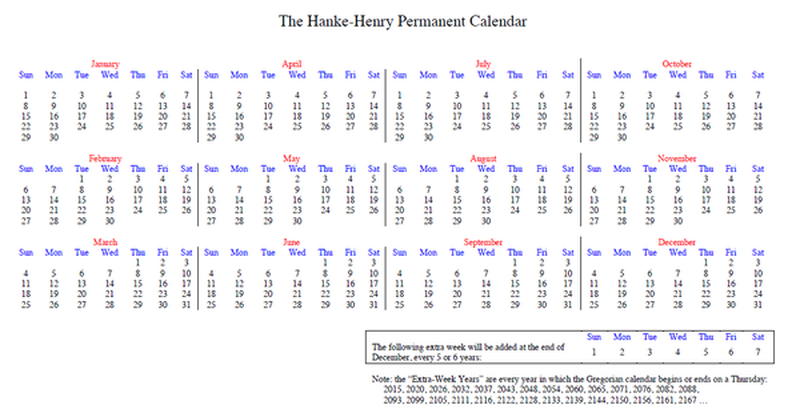New Year, New Calendar
Now that we’re in 2012 isn’t it time we start to seriously consider a new calendar system? The Gregorian calendar most countries follow was started by Pope Gregory XIII over 500 years ago and its predecessor, the Julian calendar, over 2000 years ago. Don’t get me wrong, the Gregorian calendar has served us well for a long time but modern living demands we take another look.
This year, Christmas and New Year both fell on a weekend. Awesome, right? (I call out Christmas because most other major religious holidays are already based on non-Gregorian calendars) Now imagine that was the case for the rest of your life. Such is the proposal of the Hanke-Henry permanent calendar. In summary, it states:
- A fixed calendar where each date falls on the same day of the week every year
- Each quarter has 91 days: the first two months will have 30 days, the last one 31; so, March, June, September, and December would have 31 days, all others 30 (sad demise for the rhyme “30 days have September, April, June, and November,” but good riddance)
- Every 5-6 years there is an extra week added to December in order to catch up with seasonal changes
This approach would have us covered until the year 10,000. After that, let those poor saps figure out a new one. Think about all the benefits to the switch:
- You know your exact holiday days…for life
- Schools and universities have fixed and predictable school calendars; all you parents, you know you’re onboard for this reason alone
- Business financial accounting won’t have some convoluted formula to figure out quarter ends and such
- We could use that extra week at the end of December every 5-6 years as a global holiday and celebration; I’ll resist my workaholic urges to use that extra week just to do more work; why don’t we use that extra week for Winter Olympics every 5-6 years?
- Software dependent on calendar dates is greatly simplified
- Biblical foundations of seven-day Creation is preserved; I mention this because prior attempts to adopt a new calendar violated this tenet and met with insurmountable objection
The cons? Trivial:
- Calendar manufacturers would go out of business; do something more useful and publish children’s books instead
- Lunar-based calendars will be off; they’re already off the Gregorian calendar anyway, so they just play on as they always have
- If your birthday falls on a weekday, that sucks. So what? In your lifetime you’ll only experience your birthday on a weekend only 11 or 12 times anyway; the rest of the time? You celebrate the weekend before or after anyway. Deal with it.
- What about people born in the extra week? When do they celebrate their birthday? Ask Leap Year babies. Just celebrate on the last day of the year, December 31st.
Hanke-Henry also propose adopting a universal time. So when it is 17:00 for you in San Jose, it will also be 17:00 for your friends in Amsterdam. No more time zones. This one’s going to take a larger adjustment for folks, so I’m not hopeful for this to be adopted any time soon. But it’s not necessary to adopt the permanent calendar.
The Hanke-Henry permanent calendar will sound odd at first and your initial reaction may be to resist. Give the idea a bit of time to marinate. Think on it. The more you think about it, the more you’ll realize how much more convenient your life will be when you will always know that April 15th falls on a Sunday. Join the Hanke-Henry permanent calendar movement. It’s just pure coincidence my birthday will fall on a Friday.
